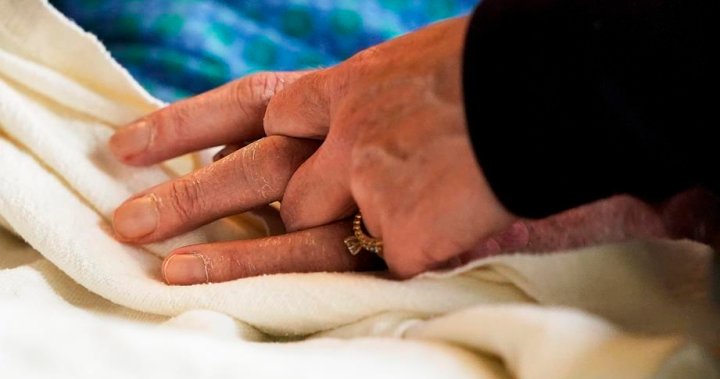‘Awful for patients’: Frustration grows over delay in assisted dying expansion – National | Globalnews.ca
John Scully has been living with a major depressive disorder diagnosis for four decades, and despite trying nearly every treatment known to medicine, from shock therapy to trans-magnetic stimulation, his condition has not improved.
The 82-year-old says he wants that suffering to end. He wants to do it legally, painlessly, in a way that respects his loved ones. He wants medical assistance in dying.
But like many Canadians who suffer from mental illnesses that their doctors have been unable to successfully treat, Scully has had to wait.
Read more:
Should assisted dying be extended to minors? Not so fast, some experts warn
The Liberal government passed legislation in 2021 that would expand eligibility to patients whose only condition is a mental disorder, which included a two-year delay so that practice guidelines could be developed. Last month, it hastily legislated another year of delay.
Scully said in an interview that the wait is beyond agonizing.
“I have utter contempt for the panels, and the government that has delayed the application of (assisted dying),” Scully said. “They can’t make up their minds. That’s the reason they kick the can down the road.”

The Liberal government’s decision to expand medical assistance in dying to people with mental illness as a sole underlying condition has sparked a wide range of reaction in Canada, which is set to join just a few countries in Europe in granting access for this reason.
Opponents, including some disability advocates, have expressed concern over whether it will further open the door to abuse and coercion, and that people will choose to end their lives when what they really need is better access to support, including housing and mental health care.
Read more:
Veterans Affairs closes investigation into assisted dying discussions
There are also concerns over a lack of consensus among medical experts over how to decide whether a mental illness is “grievous and irremediable” to meet the criteria for medical assistance in dying.
Conservative Leader Pierre Poilievre has promised to repeal the expansion should he become prime minister.
Supporters argue the move will give autonomy and dignity to people who have exhausted all other treatment options, and that not doing so would violate the Canadian Charter of Rights and Freedoms by discriminating against those a disability.
Scully, a former journalist who covered 35 war zones in a lengthy and award-winning career, also suffers from severe spinal stenosis and chronic kidney disease. But these physical ailments do not qualify him for an assisted death.

As the law stands, on March 17, 2024, Scully will finally be eligible to apply, though he expressed doubt that the government will follow through on its commitment.
He already has the paperwork. But he said he’s too frustrated to start filing out the forms. “I haven’t touched them, and I might rip them up.”
Scully described his condition as “non-stop, incessant, incurable,” and his life as “joyless” due to severe mental illness. He said he feels as though the government has backed him into a corner.
“That’s a hell of a choice they’ve imposed upon me, and I presume other folks: (assisted dying) or suicide.”
Read more:
Bill delaying assisted dying expansion for mental illness passed by House of Commons
Dr. Chantal Perrot, a family physician who does assessments and delivers medically assisted deaths, says it’s “awful for patients to be in a position of thinking that they have a choice between continuing to suffer in a major way versus taking their own lives.”
The latter also “contributes to the suffering of family and friends who love them,” Perrot said. “For most people, suicide is a very isolated and lonely act and that’s not how a dignified end of life should be.”
She said there is no need to further delay the expansion of the program.
“Each patient is going to be assessed on a case-by-case basis, taking into consideration the unique particularities of their lives and circumstances and wishes,” she said.
“We will carry out those assessments as we have assessments for all the other patients requesting (assisted dying), and we will do it with the integrity and thoroughness that we apply to all of our medical work.”

Scully said he doesn’t discount the need for consultation with doctors and family before accessing assisted death, but he said the situation has caused him to lose faith in the system and question whether it has his best interests at heart.
Ultimately, he said: “I am the one who should decide if I should die.”
Perrot said that since medically assisted deaths have become available, the diversity of people accessing them is “as remarkable as the breadth of the population.” But she can’t always do assessments, in part because many people do not qualify under the current rules.
Read more:
Engagement, better disability supports would improve assisted dying program: report
“It’s difficult telling people that they have to wait yet another year,” she said, in the case of those whose irremediable condition is a mental illness.
In a statement, Justice Minister David Lametti said he knows that the delay is frustrating and disappointing.
But he doubled down on the delay, saying it is the “prudent path forward” so the government can consider expert recommendations and practitioners can get up to speed on how to assess the complex cases.
“Medical assistance in dying is a complex and deeply personal issue for many people and their families,” Lametti said. “It is critical that we get this right.”

Many other patients are frustrated because of eligibility concerns that go beyond the current framework.
For Ron Posno, who has mid-stage Alzheimer’s and dementia, assisted dying is still out of reach _ even though he can foresee wanting to access it when his condition becomes mentally and physically debilitating.
Because when it gets to that point, he may not be able to lucidly articulate to practitioners that an assisted death is what he wants, as is currently required by law.
A special joint committee of Parliament released a report in February recommending that the government allow people with a serious and incurable medical condition, disease or disorder that leads to incapacity to put in an advance request for assisted dying.
Read more:
Canadians supportive of assisted dying law but wary of mental health expansion: poll
“My wife and I are living very well at this time of our lives, and we’re doing what we can do,” Posno said. “But part of that relief is the belief that I will access (assisted dying) when it really becomes available.”
Posno said he has already gone through all the processes involved in accessing the program, including having his request reviewed by an independent doctor. He said he has been assured by his medical providers an assisted death would be provided if the federal government decided to add advance requests to the system.
There is no sign that Ottawa is moving toward that any time soon, but Posno is still optimistic that he will be able to die in the dignified way that he wants to.
“It’s a beacon of hope for those of us who are facing something we do not want to deal with,” he said. “It gives us a way out, a beacon of hope.”
For all the latest health News Click Here




